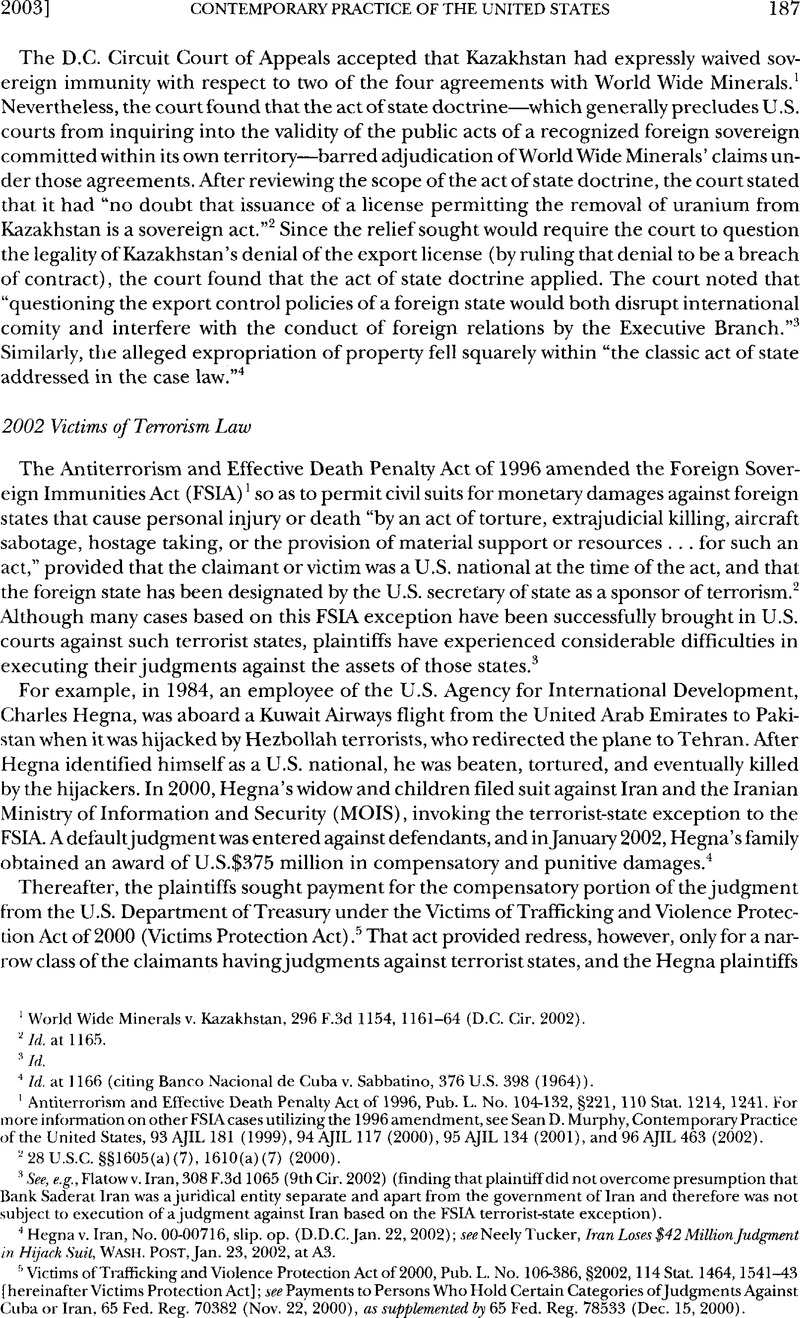No CrossRef data available.
Article contents
2002 Victims of Terrorism Law
Published online by Cambridge University Press: 10 March 2017
Abstract

- Type
- Contemporary Practice of the United States Relating to International Law
- Information
- Copyright
- Copyright © American Society of International Law 2003
References
1 Worldwide Minerals v. Kazakhstan, 296 F.3d 1154, 1161-64 (D.C. Cir. 2002).
2 Id. at 1165.
3 Id.
4 Id. at 1166 (citing Banco Nacional de Cuba v. Sabbatino, 376 U.S. 398 (1964)).
1 Antiterrorism and Effective Death Penalty Act of 1996, Pub. L. No. 104-132, §221, 110 Stat. 1214, 1241. For more information on other FSIA cases utilizing the 1996 amendment, see Murphy, Sean D., Contemporary Practice of the United States, 93 AJIL 181 (1999)CrossRefGoogle ScholarPubMed, 94 AJIL 117 (2000), 95 AJIL 134 (2001), and 96 AJIL 463 (2002).
2 28 U.S.C. §§1605(a)(7), 1610(a)(7) (2000).
3 See, e.g., Flatow v. Iran, 308 F.3d 1065 (9th Cir. 2002) (finding that plaintiff did not overcome presumption that Bank Saderat Iran was a juridical entity separate and apart from the government of Iran and therefore was not subject to execution of a judgment against Iran based on the FSIA terrorist-state exception).
4 Hegna v. Iran, No. 00-00716, slip. op. (D.D.C.Jan. 22, 2002); see Tucker, Neely, Iran Loses $42 Million Judgment in Hijack Suit, Wash. Post, Jan. 23, 2002, at A3 Google Scholar.
5 Victims of Trafficking and Violence Protection Act of 2000, Pub. L. No. 106-386, §2002,114 Stat. 1464,1541-43 [hereinafter Victims Protection Act]; see Payments to Persons Who Hold Certain Categories of Judgments Against Cuba or Iran, 65 Fed. Reg. 70382 (Nov. 22, 2000), as supplemented by 65 Fed. Reg. 78533 (Dec. 15, 2000).
6 The Victims Protection Act further amended the FSIA to make clear that the president—in the interest of national security—may prevent attachment of, or execution against, property of foreign terrorist states located in the United States that is subject to U.S. blocking statutes. The Victims Protection Act also provided, however, that claimants who either (1) possessed as ofjuly 20, 2000, a final judgment against Iran or Cuba or (2) filed suit against Iran or Cuba on one of five specified dates and received a final judgment after July 20 had three options for obtaining compensation. First, they may obtain from the Treasury Department 110 percent of the compensatory damages awarded in their judgments, plus interest, if they relinquish all rights to compensatory and punitive damages awarded by U.S. courts. Second, they may obtain from the Treasury Department 100 percent of the compensatory damages awarded in their judgments, plus interest, if they relinquish (a) all rights to compensator)’ damages awarded by U.S. courts and (b) all rights to execute against or attach certain categories of properties, such as diplomatic and consular properties, including property that is at issue in claims against the United States before an international tribunal. Third, they may decline to obtain any payments from the Treasury Department and then continue to pursue their judgments as best they can. Funds were to be obtained principally from certain blocked assets in the United States (or proceeds thereon) of Cuba and Iran, but in the case of Iran could also be drawn from U.S. funds up to a certain limit. For more information on payment of U.S. judgments against Iran and Cuba, see Murphy, Sean D., Contemporary Practice of the United States, 95 AJIL 134, 138 (2001)Google Scholar.
7 Plaintiffs’ Complaint (filed May 1, 2002), Hegna v. O’Neill, Civ. No. I:2002cv00857 (HHK) (D.D.C.).
8 Defendant’s Memorandum of Points and Authorities in Support of Motion to Dismiss and in Opposition to Plaintiffs’ Motion for a Preliminary Injunction at 1-2 (filed May 28, 2002), Hegna v. O’Neill, Civ. No. 1:2002cv00857 (HHK) (D.D.C.).
9 Letter from Henry H. Kennedy Jr., United States District Judge, to Thomas A. Daschle, United States Senate 1-2 (July 29, 2002) (on file at GWU); see Tucker, Neely, Judge Asks Hill to Overturn Law on Compensation, Wash. Post, Aug. 9, 2002, at A21 Google Scholar.
10 S. 2134, 107th Cong. (2002).
11 See 42 U.S.C. §3796 (2000).
12 Letter from Richard L. Armitage, Deputy Secretary of State, to J. Dennis Hasten, Speaker of the House of Representatives 3 (June 12, 2002) (on file at GWU).
13 Terrorism Risk Insurance Act of 2002, Pub. L. No. 107-297, Tide II, 116 Stat. 2322, 2337-40 (2002).




